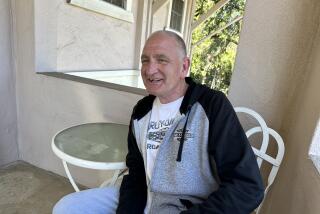Learning Drug Evils : Program Prepares Boy Scouts to Avoid Pitfalls
- Share via
POWAY — Todd Crawford, a 13-year-old Boy Scout, has earned merit badges in such traditional subjects as camping, swimming, cooking, first aid, basketry, emergency preparedness and canoeing.
But none were as hard to attain as his most recent accomplishment--a local Scouting achievement in which he attended a substance abuse workshop at an alcohol rehabilitation center, discussed drugs with a federal undercover drug agent and a San Diego street cop, and solicited pledges from fellow teens to not smoke tobacco.
Crawford and three other Poway teen-agers are the first Scouts in San Diego County to be awarded an achievement patch for completing an exhaustive course called Personal Health Decisions.
It’s the latest in an ongoing effort by Scouting executives to keep their charges physically strong, mentally awake and morally straight--this time, in the context of the drug-and-alcohol-ravaged 1980s.
Personal Health Decisions is not one of the 119 nationally recognized merit badges available to scouts, but is a separate program offered through the San Diego County Council of Boy Scouts of America.
“It’s time for us to talk about today’s situations and what’s affecting our youngsters today, rather than hiding our head in the sand and saying that if we’re good Scouts and live by the Scout oath and the Scout law, we’ll be OK. That’s not enough these days,” said local Council Executive Ron Brundage.
“There was a time when we felt we didn’t have to do a program like this because, after all, Boy Scouts don’t get into these kinds of troubles,” he said. “But then we realized that Scouts do have the same problems as anyone else, and just because he’s a Boy Scout doesn’t mean he won’t have a problem with substance abuse.”
The local program, a year in the making, is actively supported by the American Lung Assn., the Joan Kroc Foundation’s Operation Cork, the National Council on Alcoholism, the federal Drug Enforcement Administration and National University, which promises to give each boy who completes the course a $500 scholarship. The four Poway teen-agers already have received theirs.
The program was conceived by Brundage and Dr. Roy Wagner, a Scouting leader and local dentist, who together set out to establish a course “that would give boys the information they need to make the proper decisions” about substance abuse.
“We didn’t want to go for scare tactics in getting to these kids; you’ve got to let them educate themselves, by gathering their own information,” he said.
The subject of tobacco, alcohol and drugs is not altogether alien to Scouting; the “personal fitness” merit badge--the 26th most popular out of the 119 merit badge offerings--includes sections not only on personal hygiene, proper diet and mental health, but a section on “the bad affects of tobacco and alcohol and the use and abuse of drugs.”
But T.J. Van Houten, associate national director for the Boy Scouts in Irving, Tex., said local councils are encouraged to promote their own programs, such as this one.
The local Scouting office hopes that one day their program may become a recognized merit badge achievement and are encouraged that copies of the 44-page course outline already have been requested by other Scouting offices around the country for their local implementation.
To fulfill the tobacco unit requirements, scouts must find out why people begin smoking; what happens to a smoker’s body with every puff; explain the meaning and effect of second-hand cigarette smoke, and, among several options, put on an anti-smoking skit, write a letter to himself--to be opened three years later--promising not to smoke, and pass out proclamations in which other teen-agers promise not to smoke.
The alcohol unit requires Scouts to view a film on alcoholism, visit an in-patient alcoholism treatment center, write a 500-word essay on the effect of alcoholism on families, write another 500-word essay on the consequences of driving while under the influence of alcohol, and speak to a law enforcement officer about drunk driving laws.
The drug abuse unit calls for the Scouts to know first-aid procedures for drug overdose and how to tell if a person is under the influence of drugs, develop an anti-drug presentation for viewing by peers; write a 500-word essay on the physical and legal consequences of using drugs, and visit a drug recovery center.
The Poway boys who completed the requirements and were awarded the patch are Steven Kerr and Neil Towne, both 14-year-old freshmen at Poway High School, and Todd Crawford and David Brown, both 13-year-old eighth-graders at Twin Peaks Middle School.
They were the first four in the county to receive the award; today, about 700 others boys countywide are pursuing it, according to the local Scouting office in San Diego
“It was hard, but it was worth it,” Brown said. “I don’t think I’ll ever smoke and maybe not even drink and I’ll definitely never do drugs.”
Ann Jones, Crawford’s mother and a nurse for North County Health Services, supervised the boys during the six months it took to complete the program. “One question I have is whether what they’ve learned will remain with them when they’re 18 and are pressured to try drugs,” she said. “But at least . . . they have more information today about drugs and substance abuse than do most boys their age.”


